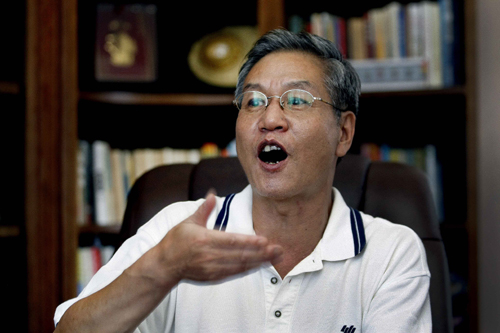Profiles
Meet your calisthenics tempo commander
(China Daily)
Updated: 2010-08-18 06:45
 |
Large Medium Small |
Beijing - Zhang Zhonglin has packed countless laurels and awards under his belt in his career spanning half a century, first as a member of China's national gymnastics team, then as a coach responsible for producing many world-class gymnasts.
 Zhang Zhonglin, 63, has recorded tempo command for China's standardized broadcast calisthenics since 1981. [Mirror Evening News] |
But there's one the 63-year-old outspoken Beijinger cherishes the most - recording the tempo command for the country's standardized broadcast calisthenics since 1981.
Broadcast calisthenics refers to a set of simple gymnastics exercise designed specially for the general public to perform against a recorded tempo command broadcast through a radio or a loudspeaker.
First introduced in 1951, broadcast calisthenics' sixth edition was held in 1981, the seventh in 1990 and the eighth in 1997.
Zhang has recorded the tempo command for the last three editions in his trademark sonorous and baritone voice, heard almost in each school across China on weekdays and sometimes at workplaces via radio twice a day at 10 am and 3 pm.
After hearing that Beijing People's Broadcasting Station has resumed the program since Monday, Zhang can't wipe the grin off his face.
"What I have achieved either as a gymnast or a coach is incomparable to what I have done with broadcast calisthenics," Zhang says. "With my recorded voice, I've helped millions improve their health."
Zhang recalls the day he auditioned to lend his voice to the concept. "The competition was furious; many candidates were professional broadcasters.
"And at that time, I had no idea what a recording studio was. But the second I mouthed the tempo command, I knew I was meant to do this. The judges thought so as well."
Zhang credited his talent to hours of reciting newspapers and imitating popular broadcasters in his spare time.
"During the cultural revolution (1966-1976), I was very fond of imitating famous broadcasters and reading newspaper articles out loud as they did," Zhang says.
The gymnast-turned-coach has now made a name for his eloquence, frequently serving as a narrator and commentator for gymnastic events.
But being a broadcaster is not an easy job, especially initially, says Zhang.
"It takes a lot of breath control to call out the whole set of tempo command in sync with the designed exercise movement and the rhythm of music," he explains. "It was easy recording the sixth edition of calisthenics. I was then in my 20s and full of energy. But when it came to the eighth, I was already a coach, yelling all day. My throat was not in the same condition as before.
"But once I heard the music, I was exhilarated. It's a feeling of commanding an army. You tend to rise above excuses."
Zhang didn't get paid a penny for the job, but that didn't matter. "At that time, people preferred public honors to material awards. I got a chance to make a contribution to my country and my people. That itself was more than enough.
"It was nice to hear that even (late State leader) Deng Xiaoping followed my command to do his exercises."
Zhang says people are used to leading a sedentary life. As an expert, he encourages people to do broadcast calisthenics, which works out the entire body.
"Without any equipment, regardless of where you are, you can manage a full-body workout," Zhang says.
"But for those who don't enjoy broadcast calisthenics, any other form of sports is better than doing nothing."